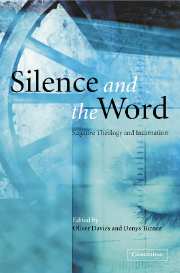Book contents
- Frontmatter
- Contents
- Notes on contributors
- Preface
- Introduction
- 1 Apophaticism, idolatry and the claims of reason
- 2 The quest for a place which is ‘not-a-place’: the hiddenness of God and the presence of God
- 3 The gift of the Name: Moses and the burning bush
- 4 Aquinas on the Trinity
- 5 Vere tu es Deus absconditus: the hidden God in Luther and some mystics
- 6 The deflections of desire: negative theology in trinitarian disclosure
- 7 The formation of mind: Trinity and understanding in Newman
- 8 ‘In the daylight forever?’: language and silence
- 9 Apophasis and the Shoah: where was Jesus Christ at Auschwitz?
- 10 Soundings: towards a theological poetics of silence
- Select bibliography
- Index
Introduction
Published online by Cambridge University Press: 22 September 2009
- Frontmatter
- Contents
- Notes on contributors
- Preface
- Introduction
- 1 Apophaticism, idolatry and the claims of reason
- 2 The quest for a place which is ‘not-a-place’: the hiddenness of God and the presence of God
- 3 The gift of the Name: Moses and the burning bush
- 4 Aquinas on the Trinity
- 5 Vere tu es Deus absconditus: the hidden God in Luther and some mystics
- 6 The deflections of desire: negative theology in trinitarian disclosure
- 7 The formation of mind: Trinity and understanding in Newman
- 8 ‘In the daylight forever?’: language and silence
- 9 Apophasis and the Shoah: where was Jesus Christ at Auschwitz?
- 10 Soundings: towards a theological poetics of silence
- Select bibliography
- Index
Summary
The classical Christian apophatic tradition, which is made available to us principally in a number of Greek patristic and Western medieval texts, feeds into three distinct currents of contemporary thinking. In the first place, it appears to offer a point of contact with the pervasive mood of atheistic secularism in modern society. Language which pivots around denials about God and a rhetoric of absence seems meaningful in the context of a widespread scepticism about traditional religious beliefs and values in a way that the increasingly exasperated or despairing repetition of kerygmatic affirmations does not. But it can seem defeatist, at best, to preach a God of the gaps to half-empty pews rather than a God who is Lord and Creator of all. Secondly, and more challengingly, negative theology can be used creatively to explore affinities with an intellectual environment in which negation – as difference, absence, otherness – is frequently judged to be more interesting than affirmation. In 1968 Gilles Deleuze wrote that difference ‘is manifestly in the air’, and the thinking of difference has broadly characterised continental philosophical development down to the present day, in the writings of thinkers such as Deleuze himself, Lyotard, Derrida, Bataille, Foucault, Lacan, Levinas and Ricoeur. If decline in religious observance reflects a real disruption of traditional patterns of belief as much as it does a mood of social iconoclasm, then the ‘turn to difference’ is more than just a fashionable rejection of the metaphysical systems of the past.
- Type
- Chapter
- Information
- Silence and the WordNegative Theology and Incarnation, pp. 1 - 10Publisher: Cambridge University PressPrint publication year: 2002
- 1
- Cited by

